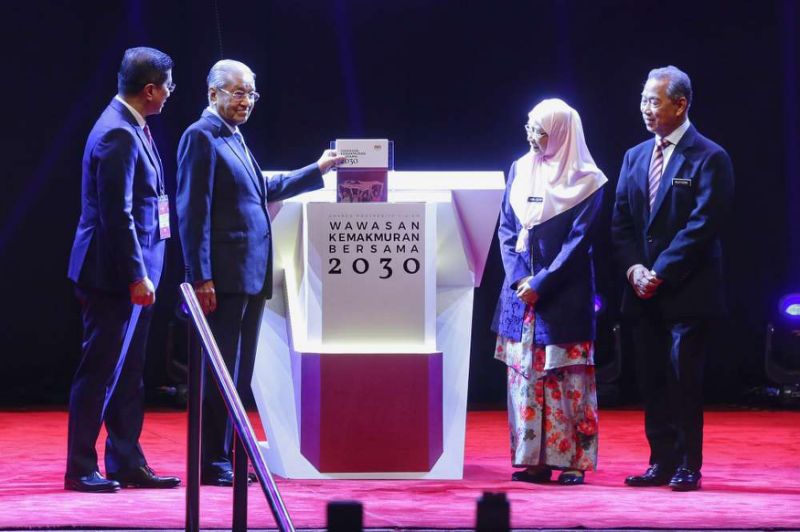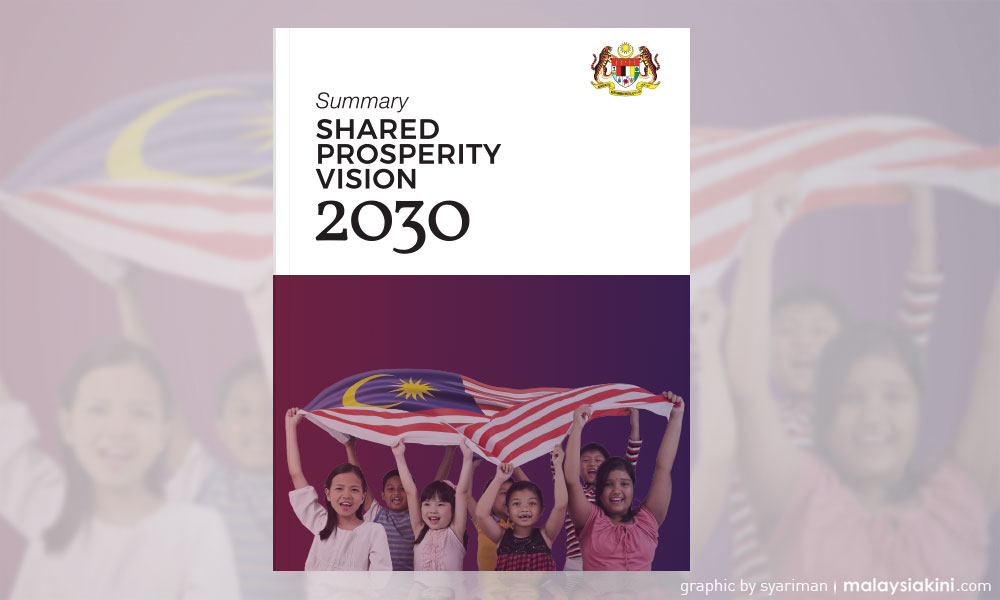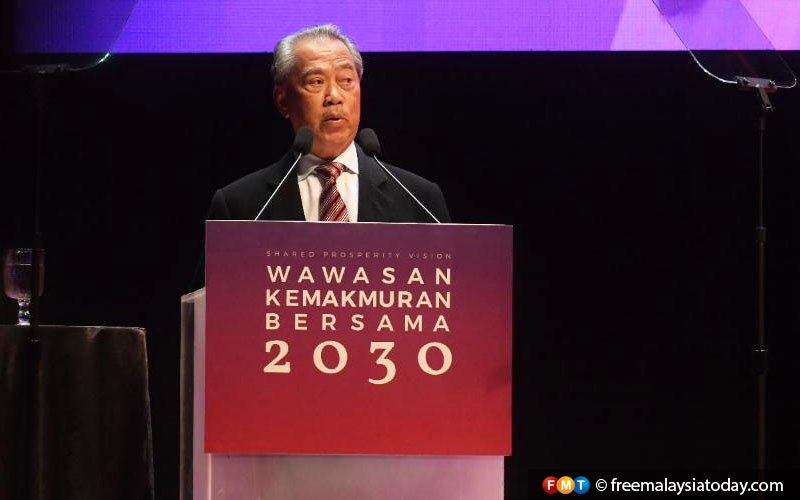“Shared Prosperity Vision 2030” is Pakatan’s Manifesto 2.0

The SPV 2030 is just one big scam. It is just like Pakatan Harapan’s GE14 Election Manifesto, which Mahathir himself said was a scam meant to trap Barisan Nasional. At best SPV 2030 is an aspiration. That is what you hope will happen. But how is it going to happen? They did not say because they do not know how it is going to happen.
NO HOLDS BARRED
Raja Petra Kamarudin
Today, Prime Minister Tun Dr Mahathir Mohamad launched Pakatan Harapan’s “Shared Prosperity Vision 2030” (SPV 2030) or “Wawasan Kemakmuran Bersama 2030” (WKB 2030) program. What is this all about? Well, you can read the three news items below to learn more about the SPV 2030 or WKB 2030.
Basically, the SPV 2030 is another New Economic Policy (NEP) or Dasar Ekonomi Baru (DEB), another Look East Policy or Dasar Pandang ke Timur, another Vision 2020 or Wawasan 2020, and so on. In short, the SPV 2030 is merely a vision or aspiration. It is what Malaysia hopes to achieve.
After reading the three news items below what does it tell you? What do they mean by “expanding the tax base and strengthening the government’s spending management”? Fancy words indeed but how are they going to do this?

They are also going to introduce “new initiatives to increase revenue and improve tax compliance as well as improving the tax efficiency.” Again, how are they going to do this?
They are also going to make sure that the “government’s expenditure management will be more transparent, especially in determining the need for megaprojects based on a cost-benefit analysis.”
Are they saying all this was never done before? What then was the government policy the last 62 years since Merdeka?
Maybe Pakatan Harapan has not realised this yet but the wheel has already been invented so they should stop talking as if the wheel has just been invented and that Pakatan Harapan invented it. Pakatan Harapan is trying to give an impression that they have discovered a marvellous new way on how to run a country. Nothing new and nothing marvellous about the SPV 2030 I’m afraid.
“The main aim of the SPV 2030 is to provide a decent living standard to all Malaysians ― regardless of their ethnicity, social class and location ― by the year 2030.” This was what the NEP was supposed to achieve by 1990 (reduce the gap between the rich and poor regardless of race). Fifty years later we come out with another NEP but with a new name.
Why has the NEP failed and after 50 years we are still not there yet? And how can the SPV 2030 succeed in just ten years when the NEP after 50 years still failed?
The government said it will focus on three key areas to achieve this aspiration. First will be by restructuring the economy to be knowledgeable-based that all groups can participate in at all levels and develop together to be more progressive. What the fook does that mean and how are they going to achieve this?
The second key area is to address the income gap so no one is left behind. This takes into account the ethnic differences, social classes, and regions within Malaysia. Again, what the fook does this mean and how are they going to achieve this?
The SPV 2030 is just one big scam. It is just like Pakatan Harapan’s GE14 Election Manifesto, which Mahathir himself said was a scam meant to trap Barisan Nasional. At best SPV 2030 is an aspiration. That is what you hope will happen. But how is it going to happen? They did not say because they do not know how it is going to happen.
Mahathir is good at coming out with “Visions” or “Wawasan”. And Pakatan Harapan’s “Shared Prosperity Vision 2030” or “Wawasan Kemakmuran Bersama 2030” is just one more aspiration in a long list of aspirations over 62 years that have failed. What you aspire is one thing. How to succeed is another. And Pakatan Harapan is rich in hope but knows nuts about how to deliver.
************************************************

(Malay Mail Online) – Prime Minister Tun Dr Mahathir Mohamad launched today the Pakatan Harapan (PH) government’s roadmap for Malaysia to progress as a nation towards becoming a real Asian tiger once more within a span of just 10 years.
The main aim of the Shared Prosperity Vision (SPV) is to provide a decent living standard to all Malaysians ― regardless of their ethnicity, social class and location ― by the year 2030.
To reach this goal, the PH government has outlined three key objectives.
First is by restructuring the economy to be knowledgeable-based that all groups can participate in at all levels and develop together to be more progressive.
Second is to address the income gap so no one is left behind. This takes into account the ethnic differences, social classes, and regions within Malaysia.
Third is build Malaysia to be united and prosperous so it can be the new centre of Asia.
To light the path ahead, the government has come up with 15 guiding principles, as below:
― Distributed economy
― Needs-based approach
― Democracy and stability
― Continuous prosperity
― Inclusivity
― Institutional political economy
― Integrity and good governance
― Equitable outcome
― Learning society
― Integrated social model
― Unity in diversity
― Equitable growth
― Future economy
― Asia economic axis
― Sovereignty and sustainability
And to enable the country towards its goal, the government has eight focus points:
― Fiscal sustainability ― Sustainable management of government finance to strengthen market and investor confidence
― Education and Technical and Vocational Education and Training (TVET) ― Increasing skilled workforce, a consistent learning society and outcome-based education
― Financial capital ― expanding businesses through holistic and SME-friendly financing
― Big data ― Using data and empirical facts under a unified system to guide policy making
― Effective institutional delivery ― Improve implementation of initiatives and outcome-based programmes
― Sustainability ― Eco-friendly development focused on conserving and preserving natural resources
― Governance and integrity ― Strengthening governance through transparency and accountability to deepen public trust
― Enlightened society ― Lifelong learning to foster intellectual discussions, experience sharing and empathy
The seven strategic thrusts in the SPV are:
― Business and industry ecosystem
― Key economic growth activities
― Human capital development
― Labour market and compensation of employees
― Improving social wellbeing
― Regional inclusion
― Social capital
There are 15 proposed key economic activities:
― Malaysia as an Islamic hub
― Digital economy
― Industrial revolution 4.0
― Asean hub
― Making Malaysia a halal and food hub
― Commodity Malaysia 2.0
― Logistics, transportation and sustainable mobility
― Coastal and maritime economy
― Centres of excellence
― Renewable energy
― Green economy
― Smart and high-value agriculture
― Advanced and modern services
― Malaysia truly Asia
The government will create eight indices to measure its progress and ensure holistic and equitable development for all. They are:
― Unity index
― Integrity and anti-corruption index
― Religious harmony index
― Health index
― Environment and climate change index
― Anti-drug index
― Crime prevention index
― Neighbourhood harmony index
************************************************

(Bernama) – Expanding the tax base and strengthening the government’s spending management are among proposals under fiscal reform necessary to lay a stronger foundation for more sustainable and inclusive growth.
In the book, Shared Prosperity Vision 2030 (WKB2030) released today, Economic Affairs Ministry (MEA) also proposed new initiatives to increase revenue and improve tax compliance as well as improving the tax efficiency.
In addition, the government has also recommended for the government’s expenditure management to be more transparent, especially in determining the need for megaprojects based on a cost-benefit analysis.
“Introducing a mechanism for managing and monitoring budgets under Parliament that acts as the budget arbitrator for the government and also sets the threshold for operating expenditure,” it said.
It also said the procurement process for all supplies and services including the implementation of open tenders would also need to be strengthened.
“Improving the public sector debt management system to be more responsible and accountable.’
The ministry also said a sustainable fiscal position is important because it is defined as the ability to maintain the government’s financial position at a reliable level without compromising the ability to manage the government’s liabilities and commitments in the long run.
“Efficient fiscal management is to determine the country’s rating by international bodies in enhancing the confidence of investors and the market.”
************************************************
(Utusan) – Wawasan Kemakmuran Bersama 2030 (WKB 2030) boleh diibaratkan sebagai ‘cas turbo’ yang akan memacu pertumbuhan ekonomi negara serta meningkatkan kuasa beli rakyat.
Menteri Hal Ehwal Ekonomi, Datuk Seri Mohamed Azmin Ali berkata, WKB 2030 adalah rangka tindakan untuk negara menjana pertumbuhan ekonomi yang rancak dan mencipta kekayaan supaya kemakmuran negara dikongsi bersama.
“Wawasan ini merupakan satu daripada ikhtiar mempertegas iltizam Kerajaan Pakatan Harapan (PH) terhadap pelaksanaan keadilan, kesaksamaan yang merentasi kaum, kelas pendapatan dan wilayah.
“Pembentangan wawasan ini tepat tatkala ekonomi global sedang bercelaru dan dilanda suasana ekonomi yang tidak menentu,” katanya dalam ucapan perasmian WKB 2030 di Pusat Konvensyen Kuala Lumpur (KLCC) di sini hari ini.
Yang turut hadir Perdana Menteri, Tun Dr. Mahathir Mohamad; Timbalan Perdana Menteri, Datuk Seri Dr. Wan Azizah Wan Ismail dan Menteri Dalam Negeri, Tan Sri Muhyiddin Yassin.

